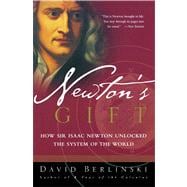
What is included with this book?
| Introduction | xiii | ||||
| A Note to the Reader | xvii | ||||
|
1 | (10) | |||
|
11 | (12) | |||
|
23 | (17) | |||
|
40 | (22) | |||
|
62 | (16) | |||
|
78 | (11) | |||
|
89 | (7) | |||
|
96 | (12) | |||
|
108 | (18) | |||
|
126 | (6) | |||
|
132 | (11) | |||
|
143 | (7) | |||
|
150 | (10) | |||
|
160 | (8) | |||
|
168 | (7) | |||
| Appendix: Descent into Detail | 175 | (30) | |||
| Newton Chronology | 205 | (8) | |||
| Index | 213 |
The New copy of this book will include any supplemental materials advertised. Please check the title of the book to determine if it should include any access cards, study guides, lab manuals, CDs, etc.
The Used, Rental and eBook copies of this book are not guaranteed to include any supplemental materials. Typically, only the book itself is included. This is true even if the title states it includes any access cards, study guides, lab manuals, CDs, etc.
Isaac Newton is the largest figure in the history of western science, his influence both inescapable and immeasurable. Newton created the disciplines of rational and celestial mechanics; he discovered the calculus; he advanced a theory of color; and he made profound and audacious contributions to pure mathematics, optics, and astronomy. By showing that a mathematical investigation of the physical world was possible, he made that investigation inevitable.
Newtonian mechanics is not only the first, but the greatest, of scientific theories. It provides an explanation for a wide range of terrestrial and celestial phenomena. Within its proper domain of application, it is extraordinarily accurate. And it embodies a combination of simplicity and scope still denied any other scientific theory.
These are very considerable virtues. They explain some but not all of Newton's influence.
Newton's masterpiece is theMathematical Principles of Natural Philosophy,or thePrincipia,as it is generally called (after its Latin title). Nothing like thePrincipiahad ever appeared before the seventeenth century; and in truth, nothing like thePrincipiahas ever appeared afterward. In very large measure, it was thePrincipiathat ignited the furious dark energies that brought mathematical physics into existence and that have sustained its fires for more than three hundred years.
The Newtonian universe is mechanical in the sense that like a clock it is self-sustaining. There is order everywhere. Planets proceed sedately along their appointed paths, holding themselves in a state of equipoise. Physical processes take place within an unchanging vault of absolute space and in accord with the unchanging beat of absolute time. Propelling itself through space, the universal force of gravitation subordinates all material objects to a single modality of attraction. And all this proceeds in accordance with simple mathematical laws.
Newton's great vision of what he calledthe system of the worldhas set the agenda for research for more than three hundred years. As the twenty-first century commences, physicists are searching for the unified theory that by means of one set of unutterably pregnant laws would explain the properties of matter in all of its manifestations. The terms of the search are by now familiar. But they are Newton's terms and before Newton, the search would have made little sense. With the theory complete, physics will have reached its appointed end simply because it has no place further to go. Everything will have been understood. Science as an intellectual activity will continue to amass facts in biology or chemistry or psychology, but those facts are destined to be amassed within the chambers of a cathedral that has already been completed. A deep silence will prevail.
If Newton'sPrincipiahas given the future of mathematical physics its characteristic shape, it has given the future its characteristic question as well. The Newtonian universe is a closed physical system. Whatever happens takes place as the result of causal interactions between material objects. There is nonetheless one aspect of the Newtonian world that is not explained by Newton's theory, and that is Newton's theory itself. The law of universal gravitation binds the world's far-flung particles into a coherent whole; but the law is itself transcendent. It cannot be given an explanation in material terms.
This is true as well for the equations governing the electromagnetic field, Einstein's field equations for general relativity, and Schrödinger's wave equation in quantum mechanics. The laws of nature by which nature is explained are not themselves a part of nature. No physical theory predicts their existence nor explains their power. They exist beyond space and time; they gain purchase by an act of the imagination and not observation, they are the tantalizing traces in matter of an intelligence that has so far hidden itself in symbols. Efforts to explain the laws of nature in terms of still further laws of nature that explain themselves have been unavailing. They are what they are.
The great physicists have always recognized that the organization of nature represents a profound mystery. They have for this reason paid homage to those laws, seeing in their symmetry and perfection something of great and ineffable majesty.
In the utterance of this sentiment, they are following in Newton's broad wake, paying homage to what he paid homage to, a captive in the end of his command.
Copyright © 2000 by David Berlinski
Excerpted from Newton's Gift: How Sir Isaac Newton Unlocked the System of the World by David Berlinski
All rights reserved by the original copyright owners. Excerpts are provided for display purposes only and may not be reproduced, reprinted or distributed without the written permission of the publisher.